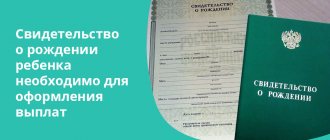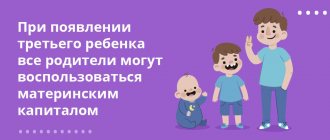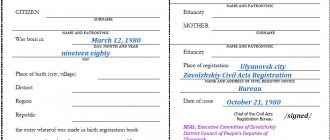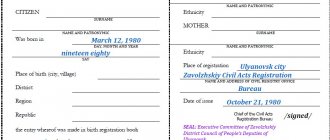The birth of a child is a great joy for the family and an important event for the state. After the demographic hole that was a consequence of the difficult and unstable 90s, the situation with the birth rate in Russia has shown a tendency towards improvement. A thoughtful and consistent policy aimed at increasing the birth rate played a significant positive role in this process. Maternity capital, preferential mortgages and other additional preferences have led to the fact that more and more families are deciding not to stop at one child and are thinking about adding to their family.
We talked with lawyer Evgenia Galkina and found out what benefits and payments a mother (and not only) are entitled to in connection with the birth of a second child, and how to get them.
Federal News Agency /
With the birth of a baby, young parents face not only pleasant troubles, but also considerable expenses associated with purchasing a dowry for a new family member. A stroller, crib and clothes for a newborn cost a lot, and one-time assistance from the state can be very helpful. From February 1, 2021, its size is 18,886.32 rubles, however, this amount may vary depending on the region of residence, the heads of which have the right to set their own coefficient.
The mother or father, or persons replacing them: guardians, foster parents, adoptive parents have the right to receive payment.
“If one of the spouses works and the other does not, they will pay the one who works,” comments lawyer Evgenia Galkina.
According to the new rules, the lump sum benefit is paid directly by the Social Insurance Fund.
An application for payment must be submitted within the first six months of the child’s life.
Federal News Agency /
What is the governor's payment?
The state supports parents with children with the help of federal and regional benefits and compensation.
Payments can be one-time (for example, at the birth of a child) or regular (monthly, quarterly, annual) until the child reaches a certain age.
We tell you more about payments to parents with children in the following materials:
- “Amount and procedure for payment of benefits for a child under 3 years old”;
- “Minimum amount of benefit for child care up to one and a half years old”.
The governor's payment is a one-time financial assistance to parents at the birth of a child, paid from the regional budget. Why are the payments called gubernatorial payments?
A governor is the highest official of a subject of the Russian Federation: region, territory, autonomous district, city. Under his leadership, regional legislators make decisions on the amounts, categories of recipients and conditions for assigning regional payments at the birth of a child.
The 2021 Governor's Maternity Benefit is a regional bonus paid in addition to federal benefits and compensation. Whether or not to include such a benefit in regional payments depends on budget capabilities, the demographic policy of the region and other nuances.
Answers to common questions
Question No. 1. Is it possible, having received a gubernatorial payment in the region of residence, to apply for a similar benefit in another constituent entity of the Russian Federation after moving and changing registration?
No, the governor's allowance is paid only once, and even if you move to another region, there is no point in applying again - the payment will be refused.
Question No. 2. Is it possible to apply for a governor's benefit if a child is stillborn?
No, regional benefits are paid exclusively for the birth of viable children, since these payments are aimed at increasing the level of childbearing and supporting families with children.
Who has the right to count on regional benefits?
Who is entitled to the governor's payment at the birth of a child? Parents or adoptive parents of a newborn child can count on regional one-time benefits if the corresponding legal regulation is in force in their territory of residence. Regional benefits for the birth of a child in 2021 are paid to all applicants without exception upon the birth of a child or are targeted (for example, only to low-income or large families).
The specific list of recipients must be clarified with the social security authorities at the place of residence, the local administration or regional legislation.
Is it possible to increase maternity capital for the birth of 3 children in the regions?
Attention! Reminder again!
In families in which a third child or subsequent children were born after January 1, 2021, maternal (family) capital is paid in the amount of 639,431 rubles. 83 kopecks, but on the condition that previously the mother did not receive state support for the family, that is, she did not receive maternity capital for either 1 or 2 children.
Each subject has its own payment amount. The average amount of gubernatorial benefits is 150 thousand rubles. At the moment there is no information about an increase in the amount of payments.
Mechanism for receiving gubernatorial payments
Despite the fact that in different regions of our country the gubernatorial allowance for the birth of a child varies in size, the procedure for applying for it follows a single scheme:
You can find out more about receiving a regional benefit for the birth of a child and fill out an application through the State Services portal if you have a verified account:
“State Services” provides detailed information about addresses, telephone numbers, work schedules of social security authorities, and where to apply for benefits. There is also a list of documents:
The documents required to receive benefits include:
A complete set of papers is not always required. For example, a document confirming the actual residence of a child with one of the parents is needed only when two unmarried parents apply for benefits at the same time. Therefore, you should check the specific list of documents at the social security department at your place of residence.
After the application and documents are reviewed by the specialists of the social security authority, a decision on the assignment and payment of benefits or on the refusal to assign and pay them will be drawn up on an official form.
When do you need to apply for accrual of payments, and how to receive them?
To be able to receive gubernatorial payments, it is necessary not only to collect a list of documents, but also to contact the territorial social security office in a timely manner.
The terms of application are also clearly defined by the legislative acts of the region - this is from 6 months after the birth of the baby to 12 months.
If the parents did not have time to submit a request for payments at a certain time, then social security, when considering the application, may refuse.
Luzhkov payments: recipients and amounts
What are Luzhkov payments at the birth of a child? In everyday life, Luzhkov payments are called payments made under the Moscow City Law “On Youth” dated September 30, 2009 No. 39. The document was signed by Yu. M. Luzhkov, the mayor of the capital during the period of development and the beginning of application of this law.
Not all categories of citizens can count on social support under Law No. 39. In paragraph 2 of Art. 23 provides that an additional lump sum payment in connection with the birth of a child is provided only to young families with permanent registration in Moscow.
The term “young family” also requires a separate explanation - the age of the spouses should not exceed 30 years (Clause 3, Article 1 of Law No. 39).
The source of payments is the Moscow city budget.
The benefit amount is determined based on two main parameters:
- the size of the Moscow subsistence minimum, established per capita of the metropolitan metropolitan population (for calculation, the subsistence minimum is taken on the date of birth of the child);
- what is the number of children in the family?
Luzhkov payments for the birth of a child in 2021 are:
Another indispensable condition that must be observed, otherwise young parents lose the right to benefits: at the birth of a second child and subsequent children, the previously born child (including the child of one of the parents) must be raised and supported by the relevant young family.
You must apply for benefits to the social security authorities no later than one year from the date of birth of the child.
Young Moscow families continue to receive the Luzhkov benefit for the birth of a child in 2021. Despite the fact that the mayor in the capital has long since changed, social protection measures for parents with children continue to apply.
Payments have been established for schoolchildren
In August - December 2021, according to Decree of the President of the Russian Federation dated July 2, 2021 No. 396, a one-time payment of 10,000 rubles will be made. one of the parents (adoptive parents, guardians, trustees) of children aged 6 to 18 years with Russian citizenship. Age 6 years must be no later than September 1, 2021.
This payment is not taken into account as part of family income when assigning other social support measures.
The Ministry of Labor announced that you can apply for a one-time benefit from July 15 to November 1, 2021 . The application is submitted in one of the following ways:
- Remotely - on the government services portal (in this case, no certificates from parents are needed);
- In person - at the Pension Fund branch. To do this, you will need the following documents: passport, child’s birth certificate, SNILS data of the parent and child, bank account details.
The application is considered by the territorial body of the Pension Fund within 5 working days from the date of its registration. If there are several school-age children in a family, one application for all of them will be enough.
The procedure and conditions for providing payments are established by Decree of the Government of the Russian Federation dated July 12, 2021 No. 1158.
The government's official website says that the first payments will begin to arrive on August 16.
Those who have a personal account on the government services portal have already started receiving notifications by email with a link to the completed application. The user needs:
- check the correctness of the data;
- confirm the automatic sending of the application to the Pension Fund.
If such a notification has not been received, then from July 15 the user can independently fill out an application in his personal account on the public services portal.
Answers from the Ministry of Labor to common questions
When exactly will the money arrive?
- The vast majority of families will receive payments on August 16.
There are two schoolchildren in the family. Will the money go to everyone?
- Yes, the payment is calculated for each school-age child. Both children can be indicated in one application.
Will I receive a payment if I am late filing my application by August 16th?
- Yes, the application can be submitted until November 1, 2021.
Who can receive the payment?
- Payments are made for children born from July 3, 2003 to August 31, 2015 inclusive.
The child is 6 years old, but is not yet going to school. Should you expect to be paid?
- Yes, since the benefit is given to school-aged children, regardless of whether they are enrolled in school. The family will receive money even if a 6-year-old child does not yet go to school or a 17-year-old teenager has already graduated from school and entered a university.
Is it possible to receive payment in cash?
- Payments are made only by bank transfer, to a card of any payment system.
One-time metropolitan compensation: types and grounds
Muscovites have the right to count not only on an additional one-time benefit in connection with the birth of a child, but also on one-time monetary compensation for expenses incurred by parents after the birth of a baby:
Applications for one-time payments to metropolitan parents in connection with the birth of children are accepted through the Portal of state and municipal services of the city of Moscow (clause 5 of Appendix No. 1 to Moscow Government Resolution No. 37-PP).
Find out how much money Moscow parents can expect from ConsultantPlus. If you do not have access to the K+ system, get a trial online access for free.
You must apply for compensation payment no later than 6 months from the date of birth (adoption) of the child. Missing this deadline deprives parents of these social benefits. The period for applying for benefits may be extended by decision of the capital’s Department of Labor and Social Protection of the Population, if the reasons for late application for payments are recognized by the court as valid:
Pregnant women receive new benefits
The rules for receiving the new benefit were approved by Government Decree No. 1037 dated June 28, 2021. A one-time benefit for women who registered with a medical organization in the early stages of pregnancy (up to 12 weeks) became monthly. The amount of payments will be 50% of the regional subsistence level. The average for Russia in 2021 is 6,351 rubles, according to the Ministry of Labor.
The one-time payment for early registration, which was previously due to everyone, was cancelled.
As the Ministry of Labor explained, the benefit is paid:
- from the month of registration , if the woman applied within 30 days of registration;
- from the month of application , if the woman applied after 30 days from the date of registration until the birth.
Just as in the case of monthly payments for children aged 8 to 17 years, payments to pregnant women will be assigned taking into account a comprehensive assessment of need. That is, those who can count on benefits:
- has an average per capita family income that is less than the subsistence level in the region;
- meets property criteria (not only the size of property in the form of real estate is taken into account, but also the presence of vehicles);
- falls under the zero income rule (the benefit is assigned if adult family members have income (scholarship, income from work or business, pension) or have no income for a valid reason related to life circumstances).
Answers from the Ministry of Labor to common questions
Will a woman receive monthly benefits if the birth is scheduled for the first of the month?
- Yes, since the monthly benefit is paid for a full month including the month of childbirth.
The woman registered before July 1, which was early. Should she expect to be paid?
- She can apply starting July 1st. In this case, the benefit will be assigned from the month of application for benefits and paid until the birth.
The woman doesn't work. Will she be paid benefits?
- Anyone who is not working when they apply for benefits can receive it if they meet the zero-income rule.
The nuances of receiving child benefits in 2020-2021
Child benefits, which include the regional child benefit, are paid from budget funds. Usually payments are made by bank transfer to the recipient's card. From July 1, 2021, transfers of all state social payments are possible exclusively through the National Payment System. This means that benefits can only be received on the Mir card. It is impossible to use cards from international payment systems (for example, Visa and MasterCard) to receive social budget payments. Read more about the innovations here.
If you received benefits on another card, fill out the appropriate application. The application form can be downloaded by clicking on the image below.
Step-by-step instructions for employees on obtaining a MIR card are available in ConsultantPlus. You can view it by getting trial access to the system for free.
Extended information on constituent entities of the Russian Federation
Republic
| name of the subject of the Russian Federation | one-time payment | other support |
| Adygea and Maykop | 1000 rub. | 115 rub. monthly for a low-income family. |
| Altai and Gorno-Altaisk | 126 rub. monthly to a low-income family from 0 to 16 years. | |
| Bashkortostan and Ufa | RUR 378.78 monthly payment to a family with an average per capita income of less than the subsistence level in the region for a child under 16 years of age; 300,000 rub. to improve living conditions for families where parents are under the age of 35 and in need of improved living conditions. | |
| Buryatia and Ulan-Ude | RUB 183.30 monthly payment to a family with an average per capita income less than the subsistence level in the region for a child up to 16 years of age | |
| Dagestan and Makhachkala | 116 rub. monthly to a family with an income of each member less than the monthly minimum in the republic until the child turns 16 years old. | |
| Ingushetia and Magas | 100 rub. monthly to a family with an income of each member less than the monthly minimum in the republic until the child turns 16 years old. | |
| Kabardino-Balkaria and Nalchik | RUB 3,149.23 | 110.29 rub. monthly to a family with an income of each member less than the monthly minimum in the republic until the child turns 16 years old. |
| Kalmykia and Elista | RUB 225.14 monthly to a family with an income of each member less than the monthly minimum in the republic until the age of 16. | |
| Karachay-Cherkessia and Cherkessk | 132.13 rub. monthly to a family with an income of each member less than the monthly minimum in the republic until the age of 16. | |
| Karelia and Petrozavodsk | 2000 rub. | 162 rub. monthly payment to a family with an average per capita income of less than the subsistence level in the region for a child under 16 years of age. |
| Komi and Syktyvkar | RUB 1,225.39 monthly payment to low-income and low-income families until the child reaches 16 years of age. | |
| Crimea and Simferopol | RUB 27,446.9 | 500 rub. monthly payment to a family with an average per capita income of less than the subsistence level in the region until the child’s 18th birthday. |
| Mari El and Yoshkar-Ola | 182 rub. monthly payment to a family with an average per capita income of less than the subsistence level in the region for a child under 16 years of age. | |
| Mordovia and Saransk | 120 rub. monthly payment to a family with an average per capita income of less than the national subsistence level until the child’s 16th birthday. | |
| Sakha and Yakutsk | RUB 6,516 | 510 rub. up to 3 children monthly payment to a low-income family. |
| North Ossetia-Alania, Vladikavkaz | 150 rub. monthly payment to a family with an average per capita income less than the republican subsistence level in the region (child under 16 years old). | |
| Mordovia and Saransk | 120 rub. monthly payment to a family with an average per capita income of less than the national subsistence level until the child’s 16th birthday. | |
| Tatarstan and Kazan | 295 rub. monthly to a family with an average income for each member less than the republican minimum living wage. Until the child turns 16 years old. | |
| Tyva and Kyzyl | 178 rub. monthly to a family with an income for each member less than the republican minimum subsistence minimum. Until the child turns 16 years old. | |
| Udmurtia and Izhevsk | 184 rub. monthly to a family with an income for each member less than the republican minimum subsistence minimum. Until the child turns 16 years old. | |
| Khakassia and Abakan | 256 rub. monthly to a low-income family with an average income less than the republican minimum living wage. Until the child turns 16 years old. | |
| Chechnya and Grozny | 130 rub. monthly to a low-income family with an average income less than the republican minimum living wage. Until the child turns 16 years old. | |
| Chuvashia and Cheboksary | 633 rub. monthly payment if the family has an average per capita income of less than 1.5 subsistence minimum in the republic; 234 rub. monthly for other families. |
The edges
| Altai Territory and Barnaul | ||
| Trans-Baikal Territory and the city of Chita | RUB 190.85 monthly for a low-income family with an average income less than the regional minimum living standards. Until the child turns 16 years old. | |
| Kamchatka Territory and Petropavlovsk-Kamchatsky | 3500 rub. for low-income low-income families | RUR 464.40 monthly for a low-income family with an average income less than the regional minimum living standards. Until the child turns 16 years old. |
| Krasnodar region and Krasnodar city | 181 rub. monthly for a low-income family with an average income less than the regional minimum living standards. Until the child turns 16 years old. | |
| Krasnoyarsk Territory and Krasnoyarsk | 250 rub. monthly for a low-income family with an average income less than the regional minimum living standards. Until the child turns 16 years old. | |
| Perm region and Perm city | 165.65 rub. monthly for a low-income family with an average income less than the regional minimum living standards. Until the child turns 16 years old; 60,000 rub. mothers aged 19-24 years, for children's needs. | |
| Primorsky Krai and Blagoveshchensk | RUB 308.88 monthly for a family with an average income less than the regional minimum living standards. Until the child turns 16 years old. | |
| Stavropol Territory and the city of Stavropol | RUB 350.00 monthly for a low-income family with an average income less than the regional minimum living standards. Until the child turns 16 years old. | |
| Khabarovsk Territory and Khabarovsk | RUB 606.75 monthly to a family with an average income per member less than the regional minimum living standards. During the period from birth until the child is 16 years old. |
Autonomous okrugs
| Yamalo-Nenets Autonomous Okrug and Salekhard | 1207.12 rub. monthly to a family with an average income of less than the monthly subsistence minimum in the district. During the period from birth until the child is 16 years old. | |
| Nenets Autonomous Okrug and Naryan-Mar | RUB 1,279.50 monthly to a family with an average income of less than the monthly subsistence minimum in the district. During the period from birth until the child turns 16 years old | |
| Khanty-Mansiysk Autonomous Okrug - Ugra and Khanty-Mansiysk | 5000 rub. (at birth to parents within 2 years from the date of marriage registration) | RUB 1,291.50 monthly to a family with an average income of less than the monthly subsistence minimum in the district. During the period from birth until the child turns 16 years old |
| Chukotka Autonomous Okrug and Anadyr | 10,000 rub. student family | 1000 rub. before the child turns 16 years old in a low-income family. |
Autonomous region
| Jewish Autonomous Region and Birobidzhan | 10,000 rubles if parents are full-time students at VAZ or a professional institution | 120 rub. monthly for a family with an average income per member of less than the monthly subsistence minimum in the region. In the period from birth to age, the child is 16 years old; 1500 rub. monthly to parents-students of universities and professional educational institutions. |
Region
| Amurskaya and Blagoveshchensk | RUB 323.58 for a child under 16 years of age in a low-income family (having an average per capita income for each family member less than the regional subsistence minimum). | |
| Arkhangelsk region and Arkhangelsk | 30,000 rub. mothers aged 22 to 24 years with a family income for each member of less than 1.5 regional subsistence minimum | 139.20 (162.40 for certain parts of the region - the Far North) monthly for a family with an average income per member of less than the monthly minimum in the region. During the period from birth until the child is 16 years old. |
| Astrakhan and Astrakhan | 500 rub. monthly for a family with an average income per member of less than the monthly subsistence minimum in the region. Either regardless of income, if the child’s parent is a single mother, or the parents are students (full-time study at a university or vocational school). And if a single mother is also a student, then the amount is 1000 rubles. The payment period is from birth until the child turns 18 years old. | |
| Belgorod region and Belgorod city | RUB 280.00 for a child under 16 years of age in a low-income family (having an average per capita income for each family member less than the regional subsistence minimum). | |
| Bryansk and Bryansk | 1000 rub. | RUB 282.00 for a child under 16 years of age in a low-income family (having an average per capita income for each family member less than the regional subsistence minimum). |
| Vladimirskaya and Vladimir | RUB 392.00 for a child under 16 years of age in a low-income family (having an average per capita income for each family member less than the regional subsistence minimum) | |
| Volgogradskaya and Volgograd | 11,400 rub. | 317 rub. monthly for a family with an average income of less than the monthly subsistence minimum in the region. During the period from birth until the child is 16 years old. |
| Vologda and Vologda | 172.50 rub. monthly for a family with an average income of less than the monthly subsistence minimum in the region. During the period from birth until the child is 16 years old. | |
| Voronezh and Voronezh | 20,000 rub. | RUB 257.40 monthly for a family with an average income of less than the monthly subsistence minimum in the region. During the period from birth until the child is 16 years old. |
| Ivanovskaya and Ivanovo | RUB 238.36 monthly to a low-income family. | |
| Irkutsk and Irkutsk | 5000 rub. if the family's average income per family member is less than 2 times the regional subsistence minimum | 312 rub. monthly to a low-income family for the period from birth until the child turns 16 years old. |
| Kaliningradskaya and Kaliningrad | 3,500 rub. | 250 rub. monthly for a family with an average income per member of less than the monthly minimum in the region. During the period from birth until the child turns 18 years old. |
| Kaluga and Kaluga | 200 rub. monthly for a family with an average income per member of less than the monthly minimum in the region. During the period from birth until the child turns 16 years old | |
| Kemerovo and Kemerovo | 290 rub. monthly to a family with an average income per member of less than the monthly minimum in the region. During the period from birth until the child turns 16 years old | |
| Kirovskaya and Kirov | 202.40 rub. monthly for a child under 16 years of age in a low-income family (having an average per capita income for each family member less than the regional subsistence minimum) | |
| Kostroma and Kostroma | 3,500 rubles if each family member has an income of less than the regional monthly minimum | RUB 115.02 monthly to a family where each member has an income of less than the regional monthly minimum until the child reaches 16 years of age |
| Kurganskaya and Kurgan | 259 rub. monthly to a family where each member has an income of less than the regional monthly minimum until the child reaches 16 years of age; | |
| Kursk and Kursk | RUB 161.18 monthly to a family where each member has an income of less than the regional monthly minimum until the child reaches 16 years of age; 900 rub. monthly for a low-income student family. | |
| Leningradskaya and St. Petersburg | RUB 26,237 in St. Petersburg | 580 rub. monthly to a family where each member has an income of less than the regional monthly minimum until the child reaches 16 years of age; RUB 2,920 if the child has medical conditions for purchasing dairy products (in St. Petersburg); RUB 3,210 student family (parents study full-time) in St. Petersburg. |
| Lipetsk and Lipetsk | 20,000 rubles, if at least one of the parents is aged from 18 to 23 years and was an orphan | 242 rub. monthly to a family where each member has an income of less than the regional monthly minimum until the child reaches 16 years of age. |
| Magadan and Magadan | RUB 26,105.58 for a student family. 10,000 rub. women from among the indigenous peoples of the North; 15,000 rub. women reindeer herders. | RUB 2,767.18 monthly for a student family, until graduation from a full-time university or college; RUB 754.05 monthly to a low-income family for the period from birth until the child turns 16 years old; RUB 130,527.88 if the mother is under 25 years old and only for certain purposes (housing, medical, education). First the certificate is issued, then the implementation. |
| Moscow and Moscow | 20,000 rub. for a family in which each member has an income of less than the monthly minimum in the region; | RUB 2,206 quarterly to a low-income family for the period from birth until the child turns 16 years old; 4000 rub. monthly to a student family (subject to low income or disability or the status of an orphan since childhood) |
| RUR 5,500 (Moscow) RUB 68,935 for parents under 30 years of age. | 1500 rub. monthly until the age of 3 for a family with an average income per member of less than the monthly minimum in the city (Moscow). | |
| Murmansk and Murmansk | RUB 438.48 monthly to a family where each member has an income of less than the regional monthly minimum until the child reaches 16 years of age | |
| Nizhny Novgorod and Nizhny Novgorod | 8000 rub. low-income family. | 100 rub. monthly for a family with an income per member of less than a regional subsistence minimum. Payments are made from birth to 16 years of age. |
| Novgorodskaya and Veliky Novgorod | 7,500 rub. | 200 rub. monthly for low-income parents. The payment is assigned from 0 to 16 years of age with re-certification. |
| Novosibirsk and Novosibirsk | 10,000 rub. Parents must be 30 or older and must be married; 5000 rub. for a student family; 6000 rub. for a young family (if at least one spouse is under 30 years old). | RUB 398.60 monthly for low-income parents. The payment is assigned from 0 to 16 years of age with re-certification. |
| Omsk and Omsk | RUB 353.02 monthly for low-income parents. The payment is assigned from 0 to 16 years of age with re-certification every 2 years; 500 rub. monthly to a student family (until graduation) | |
| Orenburgskaya and Orenburg | RUR 398.75 monthly with income per member less than 110% of the regional monthly minimum. | |
| Orlovskaya and Orel | RUB 277.23 monthly for low-income parents. The payment is assigned from 0 to 16 years of age with re-certification every 3 years. | |
| Penza and Penza | 290 rub. monthly for low-income parents for a child aged 0 to 16. | |
| Pskovskaya and Pskov | 225 rub. monthly for low-income parents for a child aged 0 to 16. | |
| Rostov and Rostov-on-Don | 389 rub. for a child under 16 years of age in a low-income family (having an average per capita income for each family member less than the regional subsistence minimum). | |
| Ryazan and Ryazan | RUB 165.99 monthly for low-income parents. The payment is assigned from 0 to 16 years. | |
| Samara and Samara | 200 rub. monthly in a family where the average income for each member is less than the monthly minimum; 280 rub. monthly in a family where the average income for each member is less than 50% of the regional monthly minimum | |
| Saratovskaya and Saratov | RUB 361.13 monthly to a low-income family. The total payment period is from 0 to 16 years. Re-registration every 3 years. | |
| Sakhalinskaya and Yuzhno-Sakhalinsk | RUB 54,444 in a family where each member has an income of less than the monthly minimum; RUR 57,438 student family. | 498 rub. monthly in a family where the average income for each member is less than the monthly subsistence minimum. |
| Sverdlovsk and Yekaterinburg | RUB 541.65 monthly in a family where the average income for each member is less than the monthly subsistence minimum. | |
| Smolenskaya and Smolensk | RUB 5,129.58 | RUB 206.34 monthly in a family where the average income for each member is less than the monthly subsistence minimum. |
| Tambovskaya and Tambov | 223 rub. monthly in a family where the average income for each member is less than the monthly subsistence minimum. | |
| Tverskaya and Tver | 181 rub. monthly in a family where the average income for each member is less than the monthly subsistence minimum. | |
| Tomsk and Tomsk | RUR 392.60 monthly in a family where the average income for each member is less than the monthly subsistence minimum. | |
| Tula and Tula | RUB 10,933.98 for parents of whom at least one is a full-time student or the family is low-income | RUB 350.61 monthly to a low-income family from birth until the child turns 16 years old. |
| Tyumen and Tyumen | 402.50 rub. monthly for a family with a total income not exceeding 15,000 rubles. | |
| Ulyanovsk and Ulyanovsk | RUB 1,100; 1000 rub. full-time students. | 200 rub. monthly for a low-income family (income per member is less than the monthly minimum in the Ulyanovsk region) |
| Chelyabinsk and Chelyabinsk | 2000 rub. | RUB 316.25 monthly for a low-income family. |
| Yaroslavskaya and Yaroslavl | RUB 4,258 | 571 rub. monthly for low-income families. |
Results
Governor's payments to parents of newborns are measures of additional state financial support. They are paid from the regional budget if the corresponding regulatory act is in force in the given territory.
To receive a payment, you must submit an application and supporting documents (child’s birth certificate, recipient’s identity card, etc.) to the social security authorities.
Please check with the social security authorities at your place of residence for the specific amounts of gubernatorial payments, the procedure for receiving them and the exact list of required documents. You can find more complete information on the topic in ConsultantPlus. Free trial access to the system for 2 days.
Who is entitled to 100,000 rubles? Who gets paid
In families in which a third child or subsequent children were born after January 1, 2021, maternal (family) capital is paid in the amount of 639,431 rubles. 83 kopecks, but on the condition that previously the mother did not receive state support for the family, that is, she did not receive maternity capital for either 1 or 2 children.
All necessary information regarding receiving gubernatorial payments can be clarified in the organization of social protection of the population, as it may be individual depending on the region.
Citizens who have long been registered in a certain region of the Russian Federation and who are raising three or more children can become holders of a regional certificate of maternity capital in the amount of 100,000 rubles.
Information about these payments must be clarified in the departments of social protection of the population, since the conditions of the program depend on the region of residence of the family and may differ. You can also study the information on the official websites of government agencies or administrations at your place of residence.
There are several conditions:
- Registration in a certain territory for at least 5 years before submitting the application.
- Birth of 3 children.
Is the procedure for applying for and receiving benefits for a second child different from the first?
To obtain financial support, the mother of the baby needs to submit documents to the financial department at work; if he is unemployed, then these papers are submitted to the MFC or the social protection department. Dad can also apply for some benefits through his employer, the social security department or the MFC. You can receive them by providing all documents and account or bank card details. The procedure for registering and receiving benefits for a second child will differ only in their number and the amount of financial support, and each package of papers will be supplemented with a certificate of the newborn child, while the certificates of all those who previously gave birth must also be attached.
Additional benefits for low-income families
If a family has an average per capita income below the subsistence level, then a monthly cash payment of 867.00 rubles is due for each child under 2 years of age.
For nutritious meals in a low-income family, funds are also allocated for a child from 1 to 3 years old in the amount of 1,146 rubles.
Another benefit for low-income families (where the income per person is below the subsistence level) is 436 rubles for a full family or 872 rubles if all the children are raised by a single mother.
Loan “Look - 5.55%” Let's go!, Persons. No. 2534
from 5.55%
per annum
up to 275 thousand
up to 2 years
Get a loan
Also, a family with three children has the right (in most regions) to compensation for kindergarten fees in the amount of 50% for the second and 70% for the third and subsequent children.
Most common mistakes
Mistake #1. A family that applied for federal maternity capital after the birth of their second child does not apply for the governor’s payment, thinking that they are no longer entitled to it. In fact, these payments do not overlap, and a family can receive both federal and gubernatorial capital upon the birth of a third child.
Mistake #2. If, after receiving the certificate, the family wants to cash out the governor’s payments, this is impossible. Payment amounts can only be spent for the intended purpose; after providing supporting documents, the money will be transferred to the company, bank, or educational institution. Depending on the purpose of spending the payments.
Mistake #3. If the family immediately after receiving the certificate wants to pay off the mortgage with regional capital. This is only possible with federal maternity capital; in order for regional maternity capital to be used for such purposes, a certain time must pass.
Error No. 4. When the 3rd child is born, the family does not apply to the social protection authorities to receive gubernatorial payments. Since after the birth of the second child the family submitted documents for maternity capital. But receiving regional payments (from gubernatorial programs) does not prevent you from receiving this benefit.
Error No. 5. The family wants to cash out the governor's benefits, but this is impossible. These funds can only be transferred to an organization after providing the relevant documents (construction company, educational institution, etc.).
Error No. 6. The family decides to pay off the mortgage with gubernatorial payments, but only federal maternity capital can be spent on this. To use the governor's maternity capital, a certain period of time must pass.
There is a federal maternity capital program, it is intended for a family in which 2 children are born. And also, there are similar projects at the regional level, but payments can already be received by parents who have had a third child. This program is called regional maternity capital. Under it, a family can receive payments in the amount of 100,000 rubles and spend it on a wider range of services.
Policy within the state stimulates demographic growth, through which the authorities help large families with financial projects. In this connection, after the birth of the 3rd child, the family has the right to apply for gubernatorial assistance in the form of benefits at the regional level. In this article we will help you learn more about this benefit and how to receive it.











